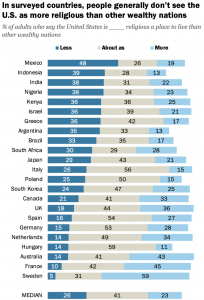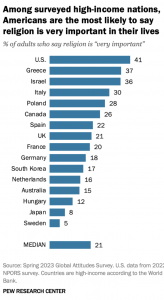Most of the world doesn’t consider the United States to be nearly as religious as many Americans do, new research shows.
According to data from Pew Research Center, 41% of U.S. adults describe faith as essential to them while only 23% of the rest of the world’s population views Americans that way. Respondents in the United States were almost twice as likely to make that claim about themselves than were their peers (at 21%) in other wealthy nations.
 Survey respondents in Sweden (59%), France (45%) and Australia (43%) were the most likely to say the U.S. “is a more religious place to live than other wealthy nations.” Mexico (48%), Indonesia (39%) and India (38%) were the most likely to describe the U.S. as a less religious place to live.
Survey respondents in Sweden (59%), France (45%) and Australia (43%) were the most likely to say the U.S. “is a more religious place to live than other wealthy nations.” Mexico (48%), Indonesia (39%) and India (38%) were the most likely to describe the U.S. as a less religious place to live.
“Far more adults in these countries say the U.S. is either about as religious as other wealthy nations (a median of 41% say this) or less religious than other wealthy nations (a median of 26% say this). In many surveyed countries, the most common response is that the U.S. is about as religious as other wealthy nations. More than half of all adults say this in Hungary (59%) and Spain (54%), for example.”
But other research continues to show a growing rift between religious adherence and its perception by Americans, whether measured in terms of self-identification, membership in faith groups or regular attendance of religious services.
In June, Gallup reported a decline in church attendance levels of 10 percentage points since 2012.
“The coronavirus pandemic caused millions of Americans to avoid public gatherings, and many houses of worship were closed to help limit the spread of COVID-19. … Most of those who reported attending religious services in 2020 said they did so virtually. Even accounting for remote attendance, however, church attendance figures were lower than in prior years,” Gallup explained.
Gallup also released a survey last month showing fewer Americans give credence to spiritual concepts once held sacred on a much wider scale. “The percentages of Americans who believe in each of five religious entities — God, angels, heaven, hell and the devil — have edged downward by 3 to 5 percentage points since 2016.”
In previous studies, Pew found Americans who identify as Christian declined from 78% in 2007 to 63% in 2021, compared to a corresponding rise from 16% to 29% in those who claim no religious affiliation.
 “The secularizing shifts evident in American society so far in the 21st century show no signs of slowing,” this report summarized. “The latest Pew Research Center survey of the religious composition of the United States finds the religiously unaffiliated share of the public is 6 percentage points higher than it was five years ago and 10 points higher than a decade ago.”
“The secularizing shifts evident in American society so far in the 21st century show no signs of slowing,” this report summarized. “The latest Pew Research Center survey of the religious composition of the United States finds the religiously unaffiliated share of the public is 6 percentage points higher than it was five years ago and 10 points higher than a decade ago.”
And in a 2022 report, Pew predicted further declines. “Depending on whether religious switching continues at recent rates, speeds up or stops entirely, the projections show Christians of all ages shrinking from 64% to between a little more than half (54%) and just above one-third (35%) of all Americans by 2070. Over that same period, ‘nones’ would rise from the current 30% to somewhere between 34% and 52% of the U.S. population.”
Yet, Pew’s study on the global view of religion in the U.S. found Americans are the most likely to say faith is “very important” in their lives. “Around four in 10 Americans (41%) say this — almost twice as many (21%) as the median share for wealthy countries surveyed.”
Greece trailed with 37% who say religion is important in their lives, followed by Israel at 36%, Italy at 30% and Poland at 28%. Canada (26%), Spain (22%), the UK (21%) and France (20%) made up the middle of the pack. Japan and Sweden, at 8% and 5% respectively, rounded out the bottom of the list, Pew said.


